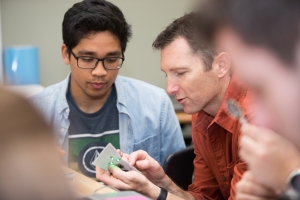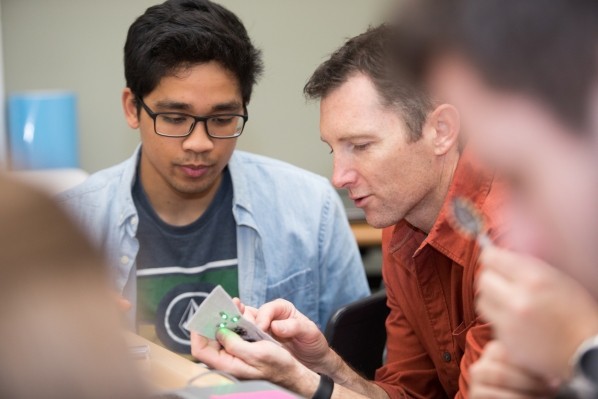By Mary Anne Savage
Appalachian State University’s College of Fine and Applied Arts places a heavy emphasis on teaching students to be “doers” as well as thinkers. Associate professor Richard Elaver, in the college’s Department of Applied Design, wanted to expand this philosophy beyond the college by connecting people, resources and technology across campus. During spring 2018, Elaver, along with several faculty in various fields of expertise, debuted Thinkering. This interdisciplinary course, co-taught by six instructors, provides students with the skills needed to solve real-world problems using cutting-edge technology and systems.
“The primary goal of the course is to bring people together so that we can learn from each other and make sure we don’t duplicate efforts,” said Elaver. “We wanted to develop a course that would link all of the different resources with both technology and the technicians.”
The five other faculty teaching the course are Frankie Flood, associate professor in the Department of Art; Taekyeom Lee, assistant professor in the Department of Art; Dr. Jeff Church and Dr. Derek Eggers, instructional technology consultants; and Emerging Technologies LibrarianHannah Pope.
The semester-long class was combination of group and individual work. Students could specialize in 3-D printing, 3-D woodcutting, 2D vector cutting or design software such as Adobe Illustrator and InDesign. With only three or four students and one or two instructors in each specialization, each student received a considerable one-on-one attention.
“It has been great because you get a lot of good experience from people in very different fields,” shared junior psychology major Sabrina Twery of Charlotte. “It’s been cool meeting the faculty, learning about their expertise and participating in different learning styles.”
Students finished the course by working together to complete a final project addressing a real-world challenge. Each group was tasked with developing two prototypes of their solution.
Twery’s group developed a solution to sleep issues.
“We thought that sleep was a big issue but most people don’t get diagnosed with sleep disorders and just deal with the issues for years,” she said. “Our solution is a window curtain that helps stimulate sleep through UV lights.”
Another student taking the course, industrial design major Chris Bielenberg, is working to redesign the Pigg-O-Stat, a device used to keep infants still during an x-ray. They learned from a local x-ray technician that the device is over 60 years old and outdated.
“When I’m graduating in two years and look back I’m going to be able to say that this specific course has put me one step above everyone in my year,” said Bielenberg, who is from Hickory. “It gave me little introductions to everything, and learning from many different professors has been invaluable.”
Elaver sees value in the experience from a professional standpoint as well, and believes he and his colleagues are developing a strong community feel for course participants.
“It’s been awesome for me personally to collaborate with my colleagues,” he said. “As a professor, you might collaborate with one or two people in your field on occasion. To be able to continuously interface with people all over campus and learn from each other has been great.”
About the College of Fine and Applied Arts
Appalachian State University’s College of Fine and Applied Artsis a dynamic and innovative group of seven academic departments, bringing together a variety of perspectives, experiences and real-world education to provide unique opportunities for student success. The college has more than 3,000 undergraduate and graduate majors. Its departments are Applied Design, Art, Communication, Military Science and Leadership, Sustainable Development, Sustainable Technology and the Built Environment, and Theatre and Dance.
About Appalachian State University
Appalachian State University, in North Carolina’s Blue Ridge Mountains, prepares students to lead purposeful lives as global citizens who understand and engage their responsibilities in creating a sustainable future for all. The transformational Appalachian experience promotes a spirit of inclusion that brings people together in inspiring ways to acquire and create knowledge, to grow holistically, to act with passion and determination, and embrace diversity and difference. As one of 17 campuses in the University of North Carolina system, Appalachian enrolls about 19,000 students, has a low student-to-faculty ratio and offers more than 150 undergraduate and graduate majors.

